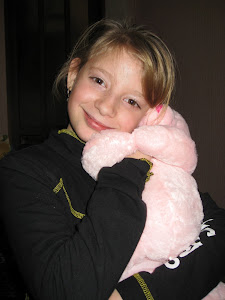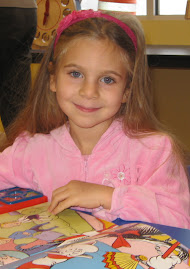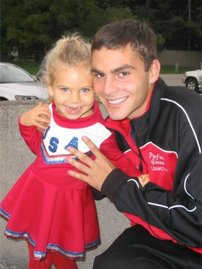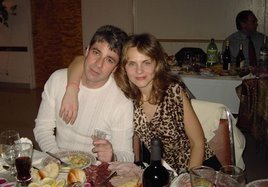We’ve been home for 2 months now, and it already feels like Rachel’s been in our family forever. She’s such a sweet little girl, very well behaved, trying to please us, always doing what she’s asked to do, etc. She and Victoria are a very good friends even though there is a healthy sibling rivalry between them :) Lately they started bickering a little bit more than before, but I think this is very normal after their “honeymoon period” has ended. There is still some jealousy between the girls in regards to the attention they are getting from Oleg and I (especially from Rachel, which is expected). We are trying very hard to spend an equal amount of time with both girls, and I think we are doing very good.
Rachel started gymnastics a couple weeks ago, and she loves it! She also started ballroom dancing lessons! Our local “Fred Astaire Ballroom Dance Studio” has a spring session for 4th-graders at our elementary school, and Rachel is a natural! Ballroom Dance is my weakness – I used to dance back in Ukraine, and Alex took several years of Ballroom Dancing as well, so my goal now is to find partners for both girls and start the formal lessons ASAP :)
Now that Rachel is getting more comfortable with her new life in America, I’d love her to find friends her age, but it’s not an easy task because her English is almost non-existent. One would argue that it’s because of the fact that we speak Russian at home, and I agree. According to
Dr. Gindis, the leading expert in international adoption, a second language is usually acquired based on two models: "additive" and "subtractive". Internationally adopted children replace their first language by a new language, it’s a subtractive model, and the immigrants learn a new language in addition to their native language, which is an additive model. Since Rachel is speaking Russian at home, she acquires English by an “additive” model, and her language acquisition is supposed to be slower. But we’ve been through this before! Oleg, Alex and I started learning English virtually from scratch. All our friends came to the country not speaking any English and were able to learn it and go on to receive BS and even MS degrees. The process to learn English in immigrant families is usually the following: start with learning some basic vocabulary, then able to translate simple written English sentences into Russian, then being able to build simple English sentences, then start understanding native English speakers, and then finally start speaking. After this stage many kids (depending on age) usually stop speaking Russian, but still understand it, so when their parents ask them something in Russian, they reply in English.
After 2 months we see some progress with English, but it is VERY tiny. Oleg and I even decided to speak to her in English, but it doesn’t work! She starts crying when she doesn’t understand us! So what’s more important for us – her language development or her happiness? Of course her happiness! Yes, she’s very behind, yes, it takes her more time to memorize things, but hey – she has all time in the world to catch up. We are working very hard tutoring her, and I’m sure she’ll get there, even it will be later then we we’d want her to.
She still loves school :) Her teachers are AWESOME! I had a parent-teacher conference last week, and even though her academic progress is not as fast, her social progress is much better! She’s trying to communicate with other kids at school, which is a huge plus with her lack of language, and she seems much more comfortable in the classroom. She’ll probably repeat 4th grade with the same teacher, and hopefully by the end of next school year we’ll see more results.
Though I’m a little bit disappointed with her slow progress, it’s something that was expected. The post-institutionalized children are usually developmentally behind because they didn’t have a chance to be nurtured and educated by their parents. Of course a child whose parents started reading to him from birth, and a child who never had an individual attention, will have different results. I firmly believe that parents play a huge role in their child’s academic progress. It’s a parents’ job to prepare the children for school, to tutor them as needed, etc. Though all children have different abilities, I can say from my teaching experience that the kids whose parents work with them at home usually are better students.
Speaking of students, I recently connected with my former students in Ukraine! There is a new social-networking website
http://www.odnoklassniki.ru/, where I found my old friends, classmates, neighbors, and even students! I used to teach Math for 6th – 9th graders, and imagine my surprise when I received a message from one of my former students! Then another, and another, and now I’m in contact with many of them! I only taught them for 3 years, but they still remember me! It was so nice to hear that I was their favorite teacher :) These “kids” are now almost 30 years old, married with their own kids, and it’s so strange when they address me formally with my patronymic name: “Nataliya Vitalievna”!
Anyway, back to my thoughts about parents working with their kids. I taught Alex to read by 4 years old, and I felt guilty that Victoria still didn’t read at 5. She recognized alphabet since 23 months old, she was doing “Color by number” and “Connect the dots” activities by 3 years old, etc., but I didn’t know how to teach her to read in English. Well, I’m happy to report that she’s reading now! These tutoring sessions with both Rachel and Victoria were good enough to get her started! Yesterday she even took one of the books to preschool and read a story to her class. The kids were very impressed :)
My other “baby” Alex doesn’t need my tutoring anymore, and even if he needed it, I wouldn’t be able to help him. Last semester he took a “Differential Equations” class, and even though I wrote my Master’s thesis in Differential Equations many years ago, I don’t remember ANYTHING :) His program requires several co-op blocks as a part of curriculum, and he’s looking for a job now. So if any of you are hiring a computer engineering/computer science/information technology intern, please let me know! Yesterday he attended a huge student job fair, and it was so neat to see him in suit and tie – he looked like a real professional!
We still didn’t have a chance to take a new family portrait, but I’m working on the plan to get everyone together for a photo session :)















 Victoria is helping her big sister with the bridge:
Victoria is helping her big sister with the bridge:





















